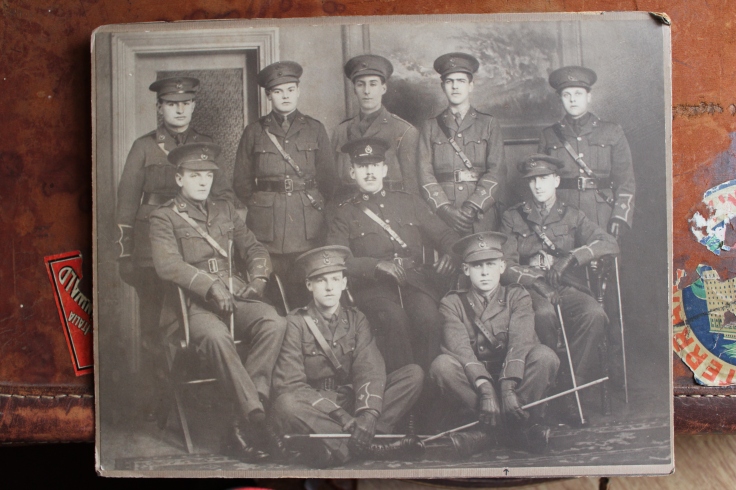
With his kit assembled and his new uniform hurriedly produced by a local tailor, the day came for Louis to begin his new military career. On Saturday the 15th of January 1916 his mother accompanied him to Cambridge Station as he boarded the London train with his new valise in his hand. From King’s Cross he headed to Waterloo and the train to Portsmouth Harbour Station. Arriving in the home of the Royal Navy was a somewhat baffling experience for an officer who had been a schoolboy only three weeks earlier – sailors saluted the young 2Lt Stokes, who had little idea of what to do in return, and he wrote to his mother that he got the ferry from the station over to Gosport, and trepidatiously approached the gate of Forton Barracks (below), the home of the Royal Marine Light Infantry.

A couple of days later, Louis wrote home for the first time on paper headed with the Royal Marines’ globe and laurel:
‘Dear all,
As I have told you, I got here all right. When I got out at Portsmouth Harbour I was saluted by a huge Marine who inquired if I was coming to Forton Barracks, and then shewed me the way up. Portsmouth Harbour is amazing to me; big ships lying about, and Nelson’s ‘Victory’ a few hundred yards out from the quay, seagulls flying about, hundreds of sailors, marines and soldiers who salute you from many yards away. You get into a steamboat which takes you across the harbour past big buoys. Then I went by tram and walking to the barracks and reported myself to the Commandant, who told me to go to the Adjutant, who was out and stayed out till about 6 (this was about 10 to 3). So I went down into Gosport and got my hat badge put right, feeling very small when great Sergeants saluted me, and sentries came “smartly to the shun” as I passed various barracks.
Then I came back and went into the Officers’ Mess and sat down and read papers; there were only three officers there as nearly everyone else was on leave. One officer (a Lieutenant risen from the ranks) had the decency to say good afternoon. I felt a bit out of place, but after a bit another temporary arrived, called Clanchy, a very decent chap. After some tea we reported ourselves to the Adjutant, whom we found in his shirtsleeves pasting picture postcards onto a screen for his small daughter. The Adj told us that we should stay here probably from 3 to 4 months, after which we might be drafted to the front, possibly Serbia, but since the Dardanelles business had stopped we might stay here longer. Tomorrow we start work, he told us, which will be drill at 8.15 for an hour, a bit later physical drill, for which we shall need white flannel trousers which you might send at the earliest opportunity and send the bill to me. Then a lecture till lunch and 2-4 in the afternoon something else.
After mess dinner (7.45) at which there were only two or three officers I and Clanchy went down to Portsmouth and to the shore and saw the Isle of Wight in the distance and all sorts of red and white lights between Hayling island and the Isle of Wight where there is a great harbour barrier. Then we went back to barracks and to bed (11 o’clock). This morning, breakfast (8) church parade – to which the temporaries marched off indifferently after falling in. Here we met some more temporaries for 10. Very decent men. Rotten service and hopeless chaplain whose name I don’t know or want to. Mechanical service, praying, singing etc. No one in the least interested. I then took another walk with Clanchy to Portsmouth and have had lunch. Clanchy is awfully decent; he has been in the merchant marine and can tell one all about ships which he does very willingly. He was wrecked off Cornwall and just after that a new order for sight testing came out (like those changing coloured lights I had at the Admiralty) and he was turned out because he could not pass it.
Now I will close. Thank you all for your various services before I went, too numerous to mention in detail. I will tell you more when I know more.
and so with love,
Louis.’
Louis and the other ‘temporaries’ of his class are shown at the top of this article – he is seated front right. ‘Clanchy’ is Arthur Clanchy, three years older than Louis and also given a temporary commission in the RMLI, but he seemingly didn’t serve in any theatre of war. In the second half of 1918 he served with the 3rd Bn RMLI, commanding the fifty-man guard on Corfu. I, too, failed the same coloured light test as him when I joined the Royal Navy in 2000, and that restricted the list of branches that I was eligible to join. Some things never change!

Leave a comment